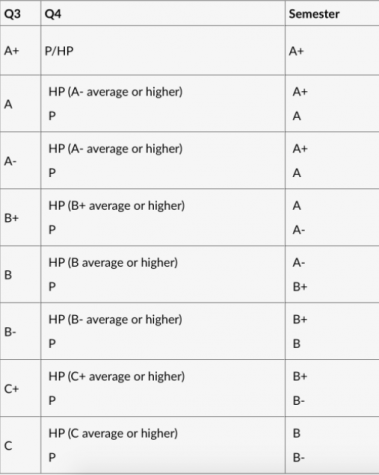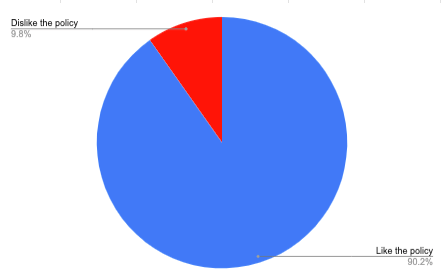Pro
As we all made our first forays into the virtual learning environment, the PDS administration quickly rolled out a new grading policy for the remainder of the second semester. They created a system that ensured no student would receive a grade below their midterm grade. Those who diligently complete their work would receive a pass, a ⅓ letter grade increase (B to B+, A- to A), and those who put in extra work and effort would receive a high pass, a ⅔ letter grade increase (B to A-, A- to A+).

This policy was made with the utmost consideration for all members of our community. The administration is aware that everyone’s situation is different during this difficult time, and they would like to account for the new responsibilities people may have to take on while adjusting to the new normal. The administration does not want to penalize anyone during this time of adjustment.. Personally, I am in support of this grading policy. Before I knew about it, a plethora of unanswered questions filled my mind, the most prominent ones concerning the effect of these grades on college applications in the fall. Thankfully, once the grading policy was unveiled, most of my questions were answered, and other members of the PDS community also appear to be happy with the new policy.

Freshman Milan Patel remarked, “I like the new grading system. It does mostly benefit kids with lower grades but my grades can’t get dropped…so it helps me out as well. I think that it is interesting that they decided not to let kids drop their grades, but it helps me so I don’t mind.” This is a common viewpoint that many students interviewed hold. The grading system promotes growth and allows for incentive to work hard during this time, because it is now relatively easier to raise your grades in classes. Junior Britney Chia said, “Yes, if you can’t do anything but improve your grade, then it’s a good policy, especially if you were struggling. You can try your best to get the grade higher. Or even if you are not happy with the midterm grade, you can reach to improve your previous work.” Overall, students are very much in support of the idea that this new policy is giving them an opportunity to work towards a higher grade. According to a recent survey, 90% of upper schoolers like the new policy.
I also see it as helpful for students who might do their best work outside of traditional assessments like tests or quizzes, which are usually the main basis of grades. With a decreased focus on these due to the online platform, students are allowed to show their dedication while earning a pass or a high pass in their classes by thoroughly completing assignments, putting hard work into projects, adding thoughtful contributions to discussions, or meeting with their teachers. Learning in this environment is difficult, but I believe that PDS has given us a wonderful opportunity to demonstrate our work ethic and continue working towards goals, even in the face of adversity.
Con
On April 17, the PDS administration sent an email to parents regarding the Upper School’s remote learning plans. The email included a link to this site, in which three major points could be concluded about the new grading policy: we will not be able to drop below our midterm average, we will not receive late penalties, and our semester grades will be based on a High Pass/Pass/Low Pass system as seen in the chart to the right.
I have always sought to raise mental health awareness, and I fully support putting mental health over academic commitments, especially during these times. Hence, the first part of the policy makes sense. Midterm grades were calculated prior to online learning and are an accurate representation of our work. With the stress brought on by the pandemic, it is understandable that keeping up the same level of work can become more difficult. I also recognize my own privileged position—I have full access to technology throughout the day, two parents who can work from home, and no family members with serious health concerns. Not everyone has the same technological access and job security, so I am also in full agreement with the second part of the policy. What I do have a large issue with is the massive inflation of term grades.
During Thursday’s US Gathering, Dr. Harrison highlighted the importance of preserving normalcy during this unprecedented event. Grades provide a sense of consistency that we need during such turbulent change. We know grades. We understand grades. The first point of the grading policy is necessary, but it does lessen the extrinsic drive to work hard in school. Our intrinsic motivation to strive for academic excellence is also falling due to daily isolation and remote learning. With mostly asynchronous classes, we are no longer engaged in compelling classroom discussions. Although I rarely procrastinate during regular school, I find myself slipping during online learning. The automatic inflation of the third part of the policy takes away much of the pride we would have felt by earning higher grades. Where is the motivation to work hard for them if we are handed much higher grades just by maintaining our midterm average? If we can receive a higher grade with a lower average? I fear that this policy will cancel out any little remaining motivation for schoolwork, thus having an inverse effect on our overall health than intended.
The loss of student motivation also begs the question: what about all the hard work of the faculty? I’ve had teachers speak in several classes about the extent of time they are putting into online lessons, from recording lectures to creating worksheets in order to replace in-class discussions. It isn’t fair to the teachers who have been putting more energy into devising interesting, creative, and non-repetitive classes for us to partake in if we end up contributing less in response—even if we don’t mean to.
This new policy also seems to disregard students who have already earned high grades. Looking at the table, I can turn an A- into an A+ just by maintaining my midterm average. Realistically, it is already quite difficult to raise a grade by that much in half a semester. Yet, I will be able to do so without even changing the quality of my work. How is that fair to those who have already earned an A+ on their midterm report? Maybe they did not work as hard to receive that A+ as I did to receive my A-. Maybe they worked harder. Regardless, it is not an excuse to give us the same semester grade without me actually achieving the same average.
I believe we can address inequities and mental health concerns without this third aspect of the grading policy. Recently, the faculty has been doing a great job raising awareness and providing opportunities for self care. Whether it be weekly meditation, yoga, or even Schoology posts reminding us not to skip meals or showers, these gestures mean a lot in the long run. This is also a great time to encourage leaders of forgotten, dormant, or even active clubs to step up and plan fun events for the community. These activities can be a way to connect with one another in a non-academic setting, and leadership by our peers can feel less intimidating than going to an event created by a teacher. If we are in class, however, increasing the amount of group activities can be a productive way to connect with classmates as well. We can schedule these activities amongst ourselves, removing the necessity to have technological access at set periods of time as synchronous lessons would. Working with our friends also provides a more relaxed way of receiving educational support, as we can bounce ideas off of each other and learn together. For greater support, I think we should bring back student mentors. SIMS has already made an announcement, but the Writing Center and FLANG have yet to announce their online presence. Maybe we can even sign up to help others in specific subjects we feel experienced in, especially those which aren’t necessarily covered by the aforementioned three groups.
One thing I also hope PDS can do in the future is be more transparent with its student body regarding such policies. In the past few weeks, we have heard about the new grading policy from Schoology posts, our advisors, and even a video filmed by Mr. Rhodes. Yet, it was only in the latter that the inflation table—perhaps the most significant aspect—was spoken about, and even then it was only mentioned in passing. Even as I write this article, several of the people I have asked to help give me feedback have had insufficient information on the policy. I like to think that PDS is proud of all of its administrative decisions, and even Mr. Rhodes said that the school worked very hard to come up with a grading compromise. So why didn’t we hear about this dramatic grade inflation directly? Why were we, the students who are actually receiving the grades, not explicitly given the table by which they would be raised?
In the PDS Student Handbook, the Statement of Philosophy lists integrity as its foremost core value. It promises to “nurture in [its] students… motivation, self-confidence, and mutual trust…” by “[providing] for them an educational atmosphere at once disciplined, playful, and diverse.” How does such generous grade inflation fit into this description? I want to earn my grades because I deserve them. I want to raise my grades because I improve my comprehension of the subject. I do not want higher grades to be dropped in my lap. PDS already leans high on the grading scale; the overwhelming percentage of students on the honor roll confirms it. But continuing to inflate grades this much? This is not the academic integrity PDS works so proudly to uphold. I love our school for its supportive, loving community, and I truly believe we can get through this global tragedy without this excessive, unmotivating, unfair aspect of the grading policy—one that we were not even directly shown in the first place.
